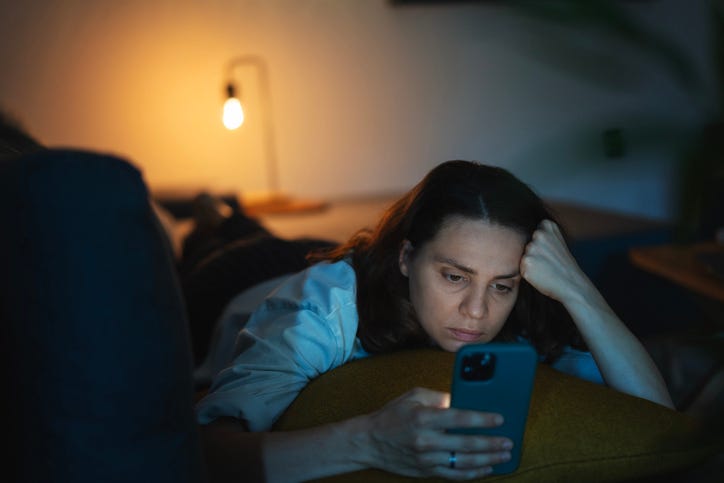
If you’ve found yourself scrolling in bed for hours on end after a long day of work, you may want to click the phone off and pick up a book, as recent research suggests that “doomscrolling” might damage our brains.
Want to get caught up on what's happening in SoCal every weekday afternoon? Click to follow The L.A. Local wherever you get podcasts.
As we become more dependent on our phones for not just communication but also entertainment, more and more people are finding themselves in patterns of constant scrolling. Tie this into what’s being circulated on social media, and researchers warn that our brains aren’t able to handle the stress we’re putting them under.
Not only does the Mayo Clinic warn that doomscrolling can affect our mental health, but constantly scrolling on social media can also have physical impacts on our bodies as a whole.
Harvard Health shared in an article last month that those who doomscroll can experience nausea, headaches, muscle tension, neck and shoulder pain, low appetite, and high blood pressure.
Another study highlighted that 70% of respondents reported difficulty sleeping because of their social media and smartphone habits.
Dr. Aditi Nerurkar, a lecturer in the Division of Global Health and Social Medicine at Harvard Medical School, shared that some find themselves doomscrolling as a way to escape the stresses of everyday life, though it can create more issues.
“It has been one onslaught after the other,” Dr. Nerurkar said. “Our brains and bodies are expertly designed to handle short bursts of stress. But over the past several years, the stress just doesn’t seem to end. Doomscrolling is our response to that.”
The article explains that when the amygdala — a part of the brain that responds to threats — has activity, it releases a stress hormone that triggers a fight-or-flight response to danger. This alone can be a driving factor for scrolling as we find ourselves needing to look for threats.
“Stress stokes our primary urge to scroll,” Dr. Nerurkar said. “We’re hypervigilant and scanning for danger. The more you scroll, the more you feel you need to.”
But that’s not all they do. The hormones released in this process also impact our attention span, problem-solving, and decision-making abilities.
Nerurkar says that this can be referred to as “popcorn brain.”
“It’s the real, biological phenomenon of feeling your brain is popping because you’re being overstimulated online,” she said. “Then it’s hard to engage with the real world, which moves at a much slower pace.”
While the prefrontal cortex and hippocampus can decrease stress hormones, they can become less effective after extreme moments of stress or frequent experiences.
According to StudyFinds.org, chronic stress exposure like this can damage the two brain regions and create prolonged cycles of anxiety.
When it comes to ways to quit doomscrolling, Cleveland Clinic shared that not setting physical restrictions, like not touching your phone in bed, at dinner, or in social situations, can help. Other tips include setting time limits, curating your feed to only show positive things, and not checking it first thing in the morning.
Follow KNX News 97.1 FM
Twitter | Facebook | Instagram | TikTok
